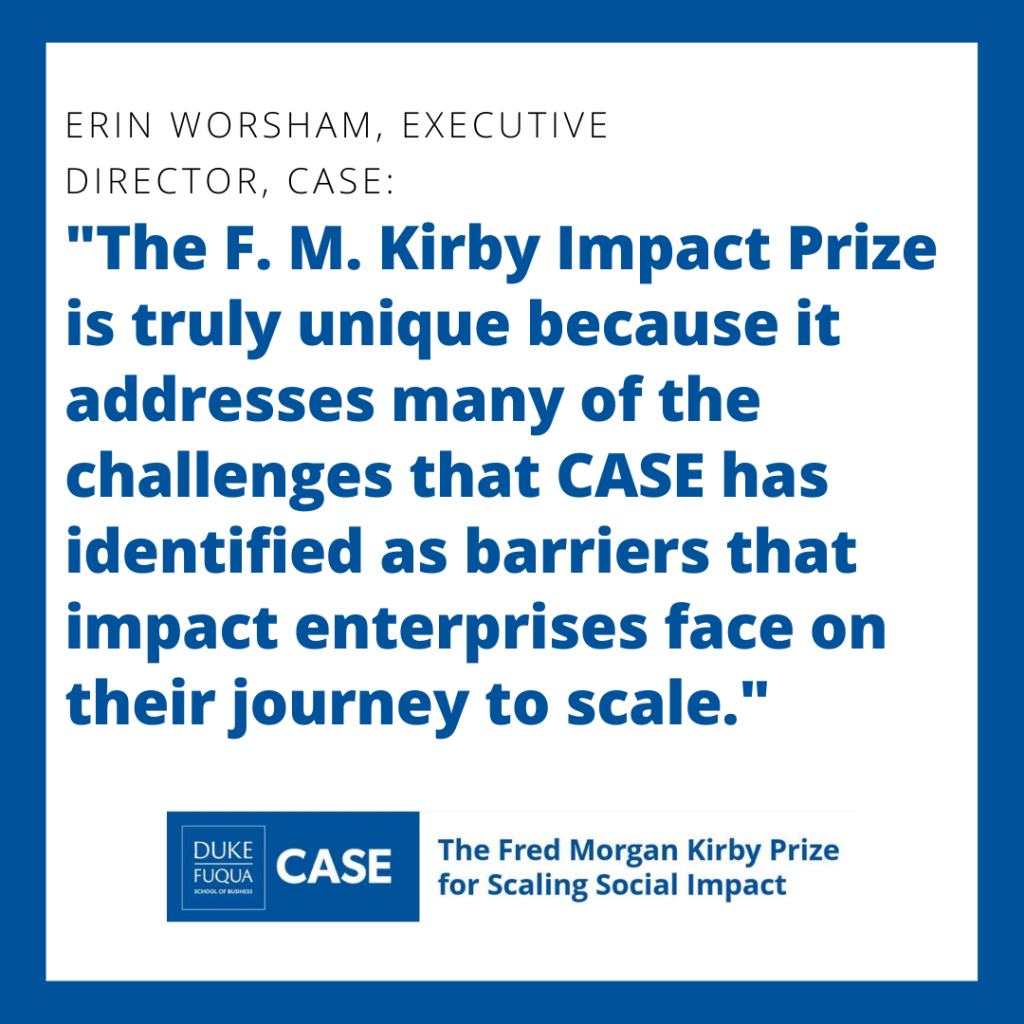
After receiving 330 applications from enterprises serving 184 countries across 5 continents, the Center for the Advancement of Social Entrepreneurship at Duke University’s Fuqua School of Business is pleased announce 14 finalists for the inaugural Fred Morgan Kirby Prize for Scaling Social Impact (F. M. Kirby Impact Prize). Named after early entrepreneur Fred Morgan Kirby and supported by the F.M. Kirby Foundation, the prize recognizes one impact enterprise each year that is working to scale its impact on social and/or environmental problems around the world.
“Amid one of the most challenging years for so many who are committed to social & environmental impact, we are deeply inspired by the scope and strength of the applicant pool for this first year of the F. M. Kirby Impact Prize,” said CASE Executive Director Erin Worsham. “There were so many incredible applicants and we were thrilled to select finalists who inspired us with their mission and impact and articulated how the prize will meaningfully contribute to their scaling plans. Their work gives us hope that many of the challenges we face can truly be solved.”
Each application was reviewed by two members of the F. M. Kirby Prize Selection Committee and evaluated across impact, readiness to scale, and leadership dimensions.
The Selection Committee narrowed the applicant pool to 14 finalists, including both nonprofit and for-profit enterprises working across Africa, Asia, and North America in the following impact areas: Economic Development, Education, Health, Housing, and Sustainability. These finalists are:
 Access Afya is a primary healthcare social enterprise delivering affordable, effective healthcare in emerging economies by providing quality-assured, low-cost micro-clinics. | Impact Area: Health Primary Geography: Kenya Years in Operation: 8 |
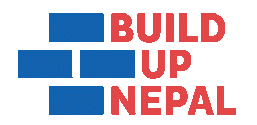 Build Up Nepal Engineering empowers rural entrepreneurs and communities to build safe, affordable homes and resilient incomes by providing climate-friendly interlocking bricks and training local entrepreneurs in brick masonry. | Impact Area: Housing Primary Geography: Nepal Years in Operation: 3.5 |
 Essmart Global bridges the gap between essential technology manufacturers and rural households in need of these services by creating a logistics chain and marketplace for these products in rural retail shops. | Impact Area: Economic Development Primary Geography: India Years in Operation: 8 |
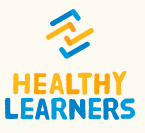 Healthy Learners’ mission is to improve the health of school-based children through community health. They accomplish this by partnering with government agencies to train teachers as community health workers. | Impact Area: Education Primary Geography: Zambia Years in Operation: 5 |
Hydrologistics Africa is working to increase access to clean and safe water in sub-Saharan Africa by offering technology solutions to re-imagine how water is accessed, monitored, and distributed. | Impact Area: Sustainabilty Primary Geography: Kenya Years in Operation: 3 |
 Lwala Community Alliance matches community innovation with university-backed research to drive improvements in health by creating committees which select, support and train local Community Health Workers and Traditional Birth Attendants. | Impact Area: Health Primary Geography: Kenya Years in Operation: 13 |
 One Heart Worldwide’s mission is to end all preventable deaths related to pregnancy and childbirth by equipping local governments and communities in underserved rural districts with the skills and capabilities to provide an effective continuum of care for pregnant women and their newborns. | Impact Area: Health Primary Geography: Nepal Years in Operation: 16 |
 Pratham Books is a nonprofit publisher addressing the global inequity of too few books for children in their mother tongue languages by providing open and free access to a digital platform of quality storybooks in multiple languages to foster the love of reading in children. | Impact Area: Education Primary Geography: India Years in Operation: 16 |
 SaCoDe’s mission is to ensure that all women and girls can manage their menstrual cycles normally and with dignity. They do this by manufacturing and distributing free, reusable, and washable menstrual pads to disadvantaged school girls and providing sexual and reproductive health community education. | Impact Area: Health Primary Geography: Burundi Years in Operation: 9 |
 Minnesota MathCorps’ (ServeMinnesota) mission is to empower and inspire children from under-served communities. They do this through teaching mathematics and fostering self-worth, strong values, and a sense of family- to build better lives for themselves and a more just society for all. | Impact Area: Education Primary Geography: United States Years in Operation: 18 |
SevaMob addresses the inequity of access to quality healthcare providers and diagnostic services in underserved and rural areas by providing artificial intelligence-enabled healthcare platforms to organizations in India and the United States. | Impact Area: Health Primary Geography: India Years in Operation: 5 |
Street Business School’s mission is to end multi-generational poverty by offering a one-time intervention that creates multi-generational change. They accomplish this by equipping women living in poverty with skills and resources to help them open and sustain micro-businesses and then share these skills with future generations. | Impact Area: Economic Development Primary Geography: Kenya Years in Operation: 4 |
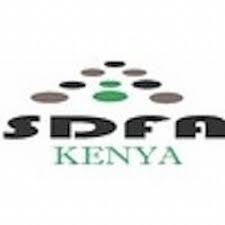 Sustainable Development for Kenya‘s Solar for Community Empowerment project works to prove that clean energy has the power to bring about social, economic and environmental stability to rural communities. They accomplish this by creating community resource centers equipped with tools and materials to assemble lanterns that are then distributed, free of charge, to women and youth who participate in their self-help programs. | Impact Area: Economic Development Primary Geography: Kenya Years in Operation: 13 |
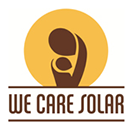 We Care Solar promotes safe motherhood and reduces maternal mortality in developing regions by providing health workers with reliable lighting, mobile communication, and medical devices using solar electricity. | Impact Area: Health Primary Geography: Global Years in Operation: 10 |
Throughout December and January, finalists will participate in interviews with the F. M. Kirby Impact Prize Selection Committee, with the winner publicly announced on February 24, 2021 at the Sustainable Business and Social Impact Conference (SBSI).
Learn more about the vision for SBSI 2021 and subscribe to CASE’s newsletter to learn when conference registration opens.

